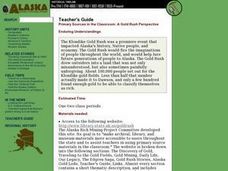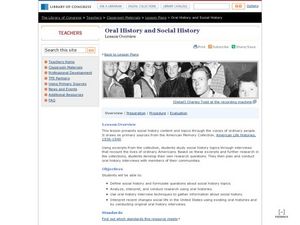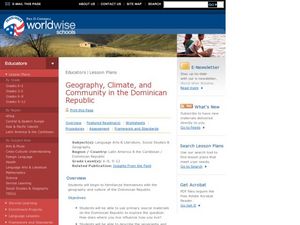Curated OER
Part III: Document-Based Question
Need a DBQ practice set? Whether or not your class is preparing for the AP exam, learners will benefit from analyzing primary source documents about economic and social change. For Part A, the short-answer questions, participants read...
National Endowment for the Humanities
The Road to the Constitutional Convention
After defeating the most powerful nation in the world, the United States had to deal with its own weaknesses in the Articles of Confederation. Activities in the lesson include analyzing primary sources from the Founding Fathers to...
Curated OER
African American Experiences: Window to the Past
Students examine African life during slavery on the Internet. In this slavery lesson, students use the Internet to research slavery and create a scrapbook. Students review pictures of slavery and label them as primary or secondary sources.
Curated OER
Primary Sources in the Classroom: A Gold Rush Perspective
Learners develop and hone their historical inquiry and analytical abilities. They draw up a list of 20 essential items they would have to bring to survive one year as a Gold Rush stampeder.
Library of Congress
Oral History and Social History
Students examine the Great Depression. In this oral and social histories instructional activity, students analyze primary sources to develop an understanding of the America in the 1930's.
Curated OER
A New Birth of Freedom: Black Soldiers in the Union Army
Students use primary documents to analyze the events surrounding black soldiers joining the Union Army. In this content area reading lesson plan, students view multiple primary documents, analyzing and answering questions about them.
Curated OER
What was Rationing?
Students analyze primary source documents to learn about World War II. In this world history lesson, students use cheese and bread rationing coupons issued during the second World War to gather information about the documents and the...
National History Day
“War Is Hell. We Know it Now.” American Soldiers in the Meuse-Argonne Offensive
Understanding the soldier's experiences during World War I sometimes takes a newscast. Learners see the importance of understanding multiple points of view with a newscast project surrounding the Meuse-Argonne Offensive. Compare and...
Curated OER
Billie Holiday's Song "Strange Fruit"
Pupils analyze a variety of primary source materials related to lynching (news articles, letters written to or written by prominent Americans, pamphlets, broadsides, etc.) in order to assess the effectiveness of the anti-lynching...
Roy Rosenzweig Center for History and New Media
European Explorers
To compare how the Spanish, French, and English approached the exploration of North America, class groups examine primary source documents and become experts on one of four explorers: Francisco Coronado, Robert LaSalle, Samuel de...
Humanities Texas
A President's Vision: George Washington
Who knew that one poster about George Washington could have so many learning possibilities attached to it? Here you'll find an attractive learning display on the first president of the United States, as well as worksheets and...
Curated OER
Unit 2: Post-Revolution: The Critical Period 1781-1878
The post-Revolutionary Period of 1781-1787, also known as the Critical Period, is the focus of a series of lessons that prompt class members to examine primary source documents that reveal the instability of the period of the Articles of...
West Virginia Department of Education
Intelligence of Authentic Character - News Coverage and John Brown's Raid
The resource, a standalone, shows how news coverage of John Brown's Raid began when the event happened and how that reporting shaped perception in West Virginia history. The resource includes interesting anticipatory discussion...
Curated OER
The Chesapeake Bay in Captain John Smith's Time
When Captain John Smith visited the Chesapeake Bay in the summer of 1608, what types of animals and habitats did he encounter? Your young historians will analyze primary source documents to answer this question, as well as compare the...
Texas State Energy Conservation Office
Fueling the Future
Future mechanical engineers and automotive technicians read about various solutions to using gasoline in cars. Included are electric, fuel-cell-powered, and hybrid vehicles.
Curated OER
Melba Pattillo and Ruby Bridges: Two Heroes of School Integration
Learners put themselves in the shoes of students who integrated Little Rock High School in 1957-58. Note: The primary resources in this activity provide powerful and poignant descriptions of what those students faced.
Curated OER
Geography, Climate, and Community in the Dominican Republic
Students examine primary source materials on the Dominican Republic in an exploration of how environment influences lifestyles. They compare and contrast life in the Dominican Republic with life in the United States.
K20 Learn
Bavaria Has Issues...Experimental Components
Do you want to be a detective by analyzing situations? An engaging lesson plan provides young historians with the tools to help them understand the difference between data types and how to analyze them to draw conclusions. Scholars...
EngageNY
TASC Transition Curriculum: Workshop 12
How can opinions slant facts? Workshop participants learn how to examine primary and secondary sources and identify the author's point of view. They also examine how visual art impacts the meaning and rhetoric of sources. Full of...
American Battlefield Trust
Life at War
It looks like a cracker, but hardtack was anything but. The staple of the Civil War soldier's diet is one of many aspects of military life that scholars consider using letters from soldiers back home and images from slavery. A PowerPoint...
DocsTeach
Reasons for Westward Expansion
"Go West, young man!" is a familiar refrain in American history. But why did people leave their homes in the East to travel westward and what impact did that movement have on people already living in the American West? By examining...
Mr. Roughton
The Travels of Marco Polo
Were the stories of Marco Polo's travels and interactions with the Mongols actually true? Using an excerpt from the book The Travels of Marco Polo, your young historians will answer guiding questions to discuss the accuracy and...
National WWII Museum
Women and the War: Supporting Historical Interpretations
Rosie the Riveter may be an iconic image from World War II, but not all historians agree on how the conflict affected women in the workplace. Individuals evaluate the writings of well-known historians on the topic, and then decide: Was...
American Battle Monuments Commission
Liberating Rome: The Anzio and Rome-Arno Campaigns
Follow the liberation of Rome in both time and space with an interactive timeline and map. As class members click on various icons on the map, they can track different countries and their troops during the Anzio and Rome-Arno Campaigns...
Other popular searches
- Primary Source Documents
- Using Primary Sources
- Primary Source Analysis
- Wwi, Primary Sources
- Rosa Parks Primary Documents
- Gilded Age Primary Sources
- Working With Primary Sources
- Primary Resources Hsie
- Web Quests Primary Sources
- Ancient Rome Primary Sources
- 1920 1929 Primary Sources
- Primary Sources and Family

























